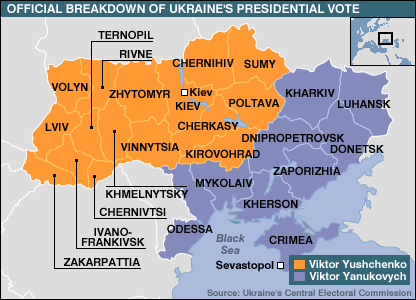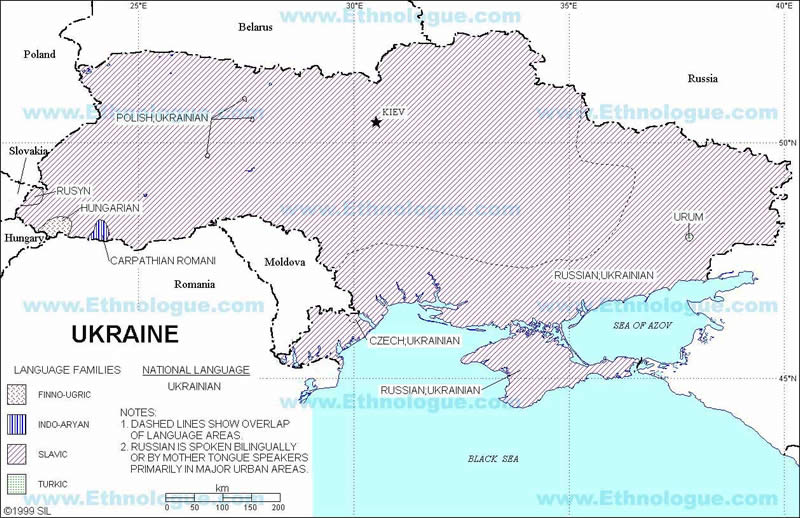November 29, 2004
Politics and language in Ukraine
The Ukrainian electoral map is orange and blue instead of red and blue, and divided east/west instead of center/surround:

Another difference is the relation between the political map and the linguistic one:
The role of language affiliation seems to be complex here, in my limited understanding. As in the Baltic republics, there is the problem of a Russian-speaking minority, used to linguistic dominance from many years of Czarist as well as Soviet rule, and now concerned about the prospect of being linguistically disadvantaged. However, in a (long, interesting) guest commentary on John Quiggins' blog, Tarik Amar suggests that this division has been exaggerated:
It is a much abused quarter-truth that Ukraine divides between a “nationalist” West and a “Russophile” East. While there are important differences between regions in Ukraine, the West-East divide has been deliberately talked up by President Kuchma’s regime to enable it to pose as a neutral arbiter. Now his chosen successor Yanukovych is escalating this reckless rhetoric to threaten with “civil war” a recalcitrant society whose political ethics and maturity seem to simply elude him. It is true that the quintessential Eastern, Russified region of Donetsk has voted overwhelmingly for its ex-governor as well as ex-petty criminal Yanukovych. Yet, a local voter turn-out of about 95 per cent, at some precincts even of 104 per cent, should make everybody very careful about attributing these results to the way its inhabitants have really voted or would have liked to vote. Donetsk is firmly in the hand of Ukraine’s most ruthless oligarcho-mafiotic clan, of whom Yanukovych is a card-carrying member. As the ex-governor told President Kuchma long ago, the Donetsk clan could get an “Orang-Utan” elected.
He points to the results in places like Kiev as evidence that the cultural and linguistic divisions do not correspond to the election results:
Crucially, even in round one the opposition managed to win all Ukrainian regions in the West as well as the Centre of the country, including – by a large margin – the largely Russiophone capital city Kyiv. The government has always liked to pretend that the opposition’s base was restricted to the Ukrainophone West, implying that it was “nationalist”, even “separatist.” Some Western observers still cling to these facile stereotypes. It is Yanukovych who has been cornered in a minority of eastern oblasts. If anybody represents an above-regional Ukrainian solidarity, it is clearly Yushchenko. He speaks proper Russian as well as Ukrainian and his being a native of one of Ukraine’s most eastern oblasts and having spent his student and working life in western as well as central Ukraine cannot be matched by Yanukovych, whose biography is strictly mono-regional and whose Ukrainian is not perfect.
On the other hand, in a comment at Fistful of Euros, Michael S writes that
Kiev is not so much a russophone as a bilingual city. That makes a big difference from eastern regions, where most city dwellers have only studied Ukrainian as a foreign language in school.
It’s also not a much of a news item that Yanukovych managed to scare some Russian speakers. There’s no language on earth whose speakers he wouldn’t scare. It’s much more remarkable how Yushchenko’s campaign let itself be turned into a handy scarecrow for the same constituency. Even its main slogans weren’t tranlated. When people gather at pro-opposition rallies in strictly russophone cities, they can only make speeches in Russian, but their chants are all in Ukrainian. In a way, it’s been remarkable to see Ukrainian make the transition (in Ukrainian-Russians’ eyes) from its traditional place of a bumpkin cousin of Russian to the language of civic courage, but from a political standpoint, I think it was a big tactical mistake.
There’s a letter from Lugansk waiting in Maidan’s translation pipeline that points this out from first-hand experience. A lot of people in the east were led to believe that a Yushchenko administration would make mastery of Ukrainian a prerequisitve for making a living.
Several years ago, I had an interesting exchange about Russian and Ukrainian with an undergraduate, originally from Kiev, who was enrolled in my intro linguistics course. I'd given a lecture about language and thought, Whorf, and Sapir's notion of "formal completeness":
The outstanding fact about any language is its formal completeness ... To put this ... in somewhat different words, we may say that a language is so constructed that no matter what any speaker of it may desire to communicate ... the language is prepared to do his work ... The world of linguistic forms, held within the framework of a given language, is a complete system of reference ...
The student came up after the lecture, to explain carefully and emphatically that Sapir and I were wrong. She had spoken both Russian and Ukrainian all her life, and she was prepared to state without any uncertainty or qualification that Russian was simply a more complete and expressive language. "There are many things that I can say easily in Russian that I could not possibly say in Ukrainian." She was happy to provide examples -- as I recall, some of them involved particular word-sense distinctions present in Russian and lacking in Ukrainian, while others involved cultural resonances, especially literary ones.
Not being competent to argue the point on the facts, I was forced to fall back on generalities and platitudes about the possibilities of lexical borrowing, the availability of paraphrase, the difference between connotation and denotation, the valuation of elite and popular culture... The point here is just that there is apparently some linguistic prejudice among bilingual but Russian-dominant residents in Kiev (and perhaps other large cities). To the extent that this attitude is common, Yushchenko's success in Kiev supports the view that the campaign transcends cultural and linguistic identity.
However, it seems that in the current Ukrainian election campaign, the cultural stereotypes are inverted. It's the Russophone Yanukovych who is nekulturny. Tarik Amar again:
A big man of few words and two criminal convictions (strictly not political), Yanukovych confirmed his image as the candidate from the “zone” – i.e. jail – by publicly abusing his opponents and their voters as “goats”, prison slang for stool-pigeons and passive homosexuals. His penning his profession into official papers as the Ukrainian equivalent of “pryme-meenister” and his – very dubious – academic degree as “proffessor” were the comic relief of the campaign. Yanukovych’s tough order to his bodyguards to sort out a Second World War veteran, who dared challenge him, starkly contrasted with his already famous dying-swan performance when hit by a raw egg. Collapsing, he was hurried away in best line-of-fire fashion. Yanukovych's talking Tarantino and turning tail, capped by his initial refusal to join a legally obligatory TV debate with Yushchenko before round two, hugely popularized jokes about eggs and Yanukovych – with eggs, by a simile common to many languages, standing for male courage or its absence.
[Update 11/30/2004: More on this, along with a terrific combined map, from Tobias Schwartz at A Fistful of Euros. And DoDo proposes a three-way rather than two-way historical and cultural division in Ukraine.]
Posted by Mark Liberman at November 29, 2004 10:05 AM
